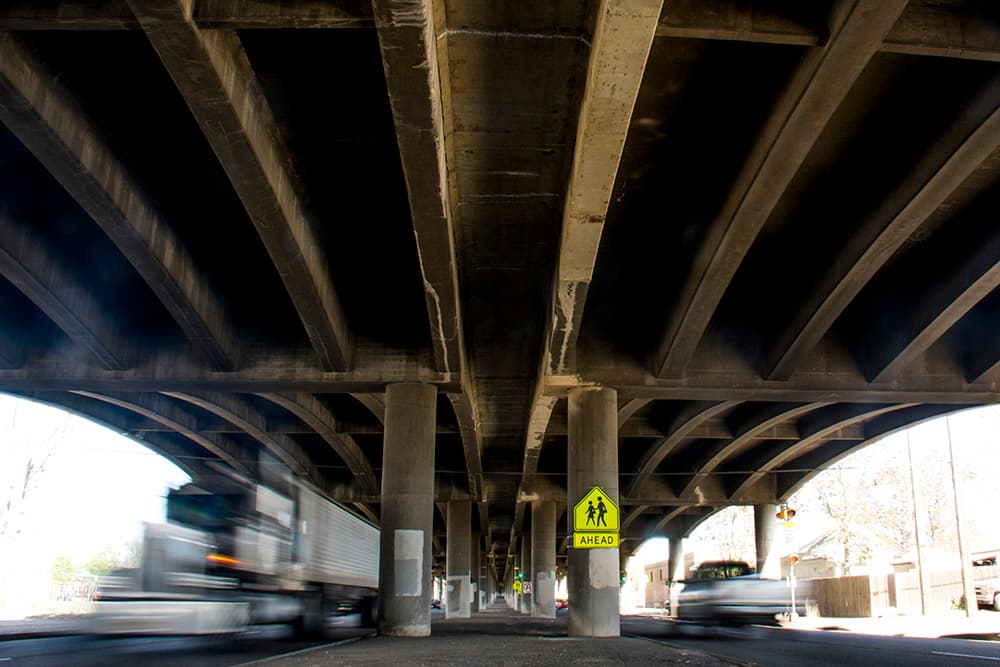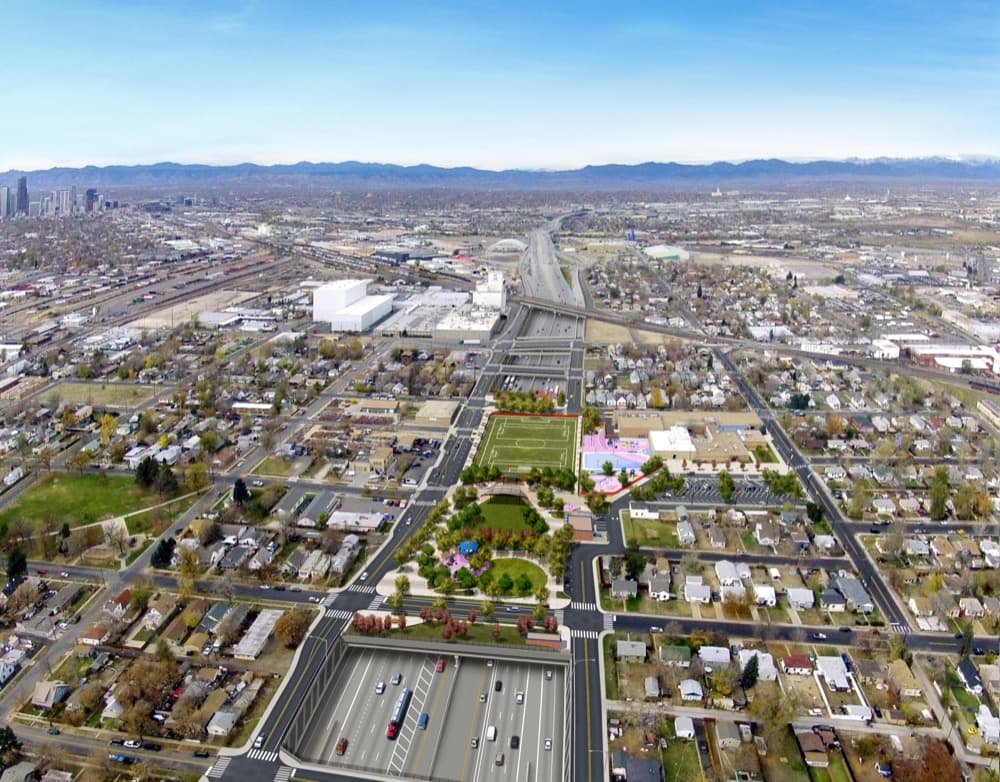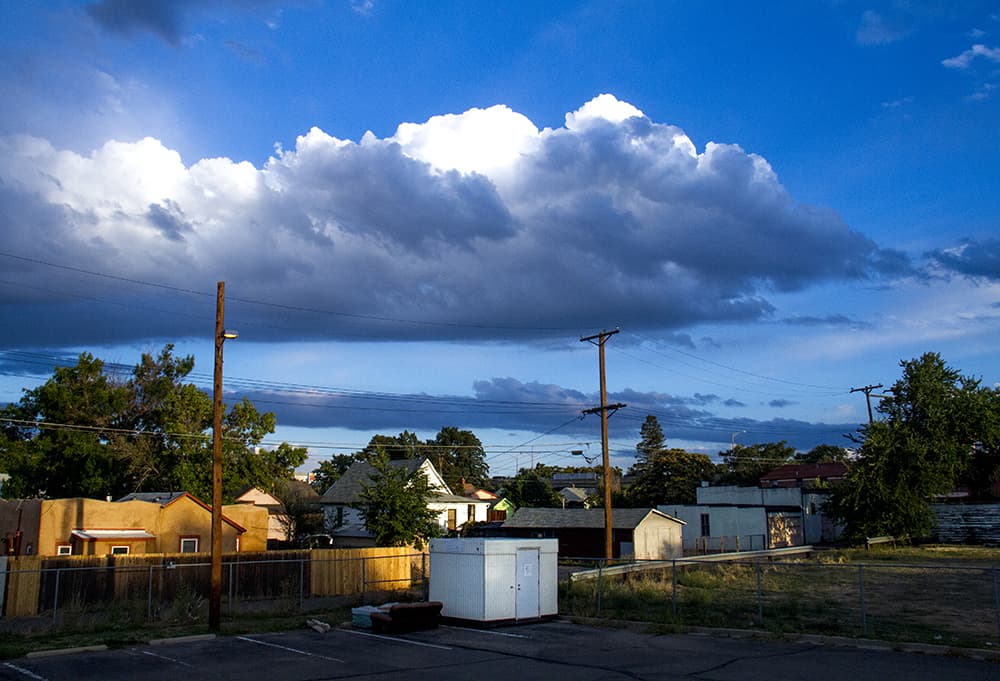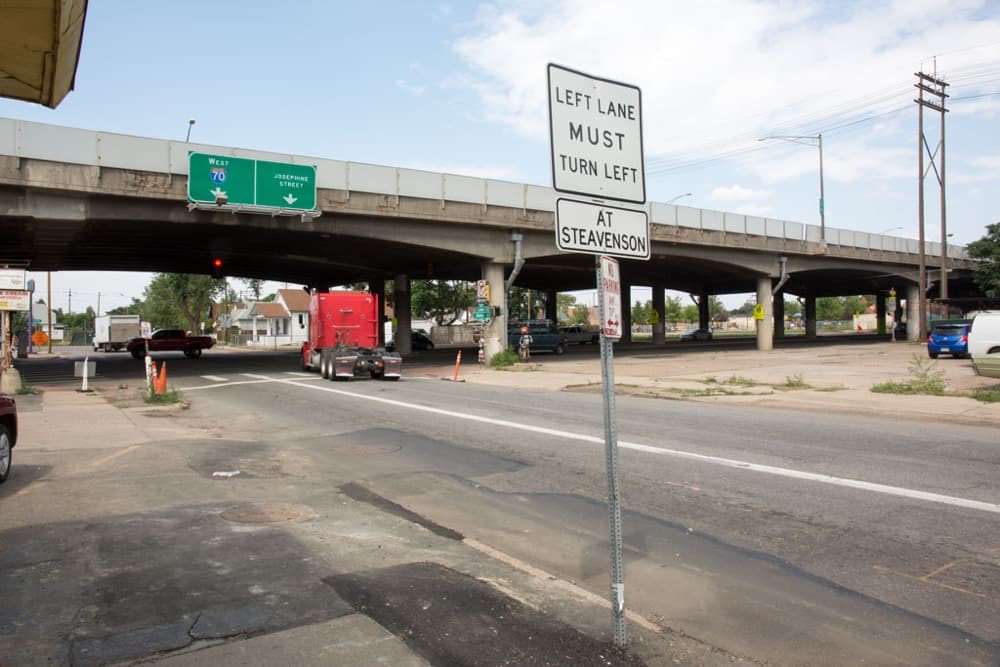
The Federal Highway Administration gave its approval in January 2017 to the widening of I-70 through northeast Denver, but community groups are still fighting hard to stop the expansion. At a meeting in Elyria-Swansea in February, CDOT director Shailen Bhatt told opponents that it's "the American process" to sue if you don't like a decision -- and they have more than taken him up on that challenge.
There are four lawsuits playing out in local and federal courts that touch on the project in some way, two of them focused on a related drainage project, Platte to Park Hill, and two of them focused on air quality issues and the impact to the Elyria-Swansea neighborhood through which I-70 runs.
Here's what you need to know:
First, a reminder of what the Colorado Department of Transportation has in mind.
I-70 from Brighton to Colorado boulevards will become 10 lanes wide and be dug into the earth. There will be new 46th Street frontage roads on the north and south sides of the highway. That road runs underneath the viaduct today.
Altogether, it will be 247 feet wide, compared to 95 to 100 feet for the existing viaduct. There will be a park on top of a cover over a portion of the sunken highway. CDOT is taking 56 homes and 18 businesses for this project.

This project has been 13 years in the making, and the lawsuits started even before the Federal Highway Administration gave the go-ahead.
The EPA lawsuit is about the air quality standard against which the expansion is measured.
This lawsuit was filed back in March 2016 by the Sierra Club, the Elyria-Swansea Neighborhood Association, the Cross Community Coalition and Citizens for a Greater Denver, and it targets changes the Environmental Protection Agency made to how it measures air pollution before the highway project was approved. Under the new rules, some high pollution days can be discarded -- and it was just those high pollution days that would have taken the project out of compliance and made it ineligible for federal funds, the plaintiffs allege. They also contend that change was made inappropriately and without public comment and made it easier for CDOT to get its project through.
This lawsuit has survived a merits hearing -- a first step in environmental lawsuits that turn on highly technical details. Basically, there is enough "there" there to move forward. It's scheduled for oral arguments in Washington, D.C., in September.

There's also a lawsuit about how the city uses City Park Golf Course in a flood control project.
What's this have to do with the I-70 expansion? The plaintiffs, who include a retired state attorney general, believe that the city's plan to use City Park Golf Course for stormwater detention as part of the larger Platte to Park Hill flood control project is a violation of the city charter and being done only to protect I-70 from flooding once it's below grade. The city charter bars the use of designated park land for non-park purposes, as well as the disposal of park land, and even though the golf course will remain a golf course, the plaintiffs allege the stormwater project is a non-park use and the connection to I-70 makes it a disposal of park land.
The lawsuit survived city motions to dismiss and requesting summary judgment. "Much to the dismay of the plaintiffs," per attorney Aaron Goldhamer, the city was able to keep a lot of planning documents secret by exerting "deliberative privilege."
There was a four-day trial in this case in August, and a decision is pending. Whatever the outcome, the verdict could be appealed. And even if the golf course can't be used for detention, CDOT has its own flood control plans that it can just stick with instead of relying on the Platte to Park Hill project.
Update: A Denver District Court judge found that the project can proceed. There's no problem with the fact that it benefits the I-70 expansion or that park land is being used for flood control. The plaintiffs could still appeal.

Jessica Brody, one of the city attorneys working on the case, told the Denver City Council she feels "very optimistic" about the city's chances. The project is, she said, "very consistent with our charter and our zoning code." Golf courses around the country are used for stormwater detention.
Denver City Council is moving ahead with contracts for the project before the lawsuit is even heard.
Two lawsuits filed in July allege the I-70 project does not comply with the National Environmental Policy Act.
NEPA requires that many types of projects go through an environmental impact statement process, which the I-7o expansion did. These lawsuits claim that CDOT didn't do the EIS process correctly, but the party being sued is actually the Federal Highway Administration because these lawsuits ask for review of the federal record of decision that approved the project. The two lawsuits address different aspects of the project -- flood control and air quality.
Kyle Zeppelin, Brad Evans, Christine O'Connor, Kimberly Morse and Jacqueline Lansing vs. Federal Highway Administration
This lawsuit targets the connection between the Platte to Park Hill flood control project and I-7o. The plaintiffs claim the environmental impact analysis for the highway did not fully take into account either the effects of tunneling through a Superfund site or the relationship between the highway expansion and the Platte to Park Hill flood control project.
Specifically, they say the city's own documents show that the flood control project was put under city auspices because making it explicitly part of the highway project would trigger additional environmental reviews that would further delay the expansion.
CDOT says its own flood control solution was part of the EIS, and Platte to Park Hill is a separate city process that may or may not happen. Nonetheless, CDOT has pledged $63 million to the project if it's completed on time for I-70.
"These are huge decisions that have not been adequately analyzed under NEPA, and the public is entitled to that analysis," said Goldhamer, who is also an attorney in this case.
City officials say the flood control project is responsible coordination, not nefarious collusion.
"The City's Platte to Park Hill drainage project is focused on providing protection to Denver neighborhoods that are most at risk for flooding," said Nancy Kuhn, a spokeswoman for Denver Public Works. "It happens that in doing so, we also reduce the volume of stormwater that flows to I-70. Thus, it made sense to coordinate with CDOT to try to save time and cost. This is responsible project delivery that the taxpayers should expect of public projects."
Sierra Club, Elyria and Swansea Neighborhood Association, Chaffee Park Neighborhood Association and Colorado Latino Forum vs. Secretary of Transportation Elaine Chao, the Federal Highway Administration and FHA Division Administrator John Cater
This lawsuit is about air quality issues, how they were and were not addressed in the environmental impact statement -- and environmental justice. Residents of these neighborhoods already have a 50 percent higher rate of death from cardiovascular disease and a 40 percent higher rate of children hospitalized due to asthma than other Denver neighborhoods, according to a city study. The average lifespan is 3.5 years lower.
The lawsuit alleges that the EIS failed to fully take into account alternatives and mitigation measures, failed to account for an increase in fine particles and failed to address likely violations of the Clean Air Act if the project goes forward.
"The Federal Highway Administration everywhere in the county has assiduously avoided acknowledging that pollution from highways is killing people," said attorney Bob Yuhnke. "They have opposed this kind of analysis everywhere because they understand that if the public understands how dangerous it is, they would be a lot more opposed to expanding highways."
As with other aspects of the project, CDOT stands behind its air quality analyses.

How will the courts consider the claims in these lawsuits?
Mark Squillace is a law professor at CU Boulder specializing in natural resources law and an author of The NEPA Litigation Guide. He said NEPA cases are very "fact dependent."
While you can almost always argue that something that wasn't considered should have been considered, courts tend to be fairly deferential to decision-making agencies and how they approach these questions, he said. But if certain findings were disregarded to arrive at the preferred alternative without adequate explanation for why they were disregarded -- or if substantive comments from the public were not addressed -- then an agency could be vulnerable.
The court can only consider the record that the agency put together, and to invalidate that process, the court has to find that "the agency decision was arbitrary or capricious or an abuse of the law."
Air quality issues are a little more black and white, Squillace said. If the plaintiffs can make a strong case that the project will take the area out of compliance with federal law for key pollutants, "that's a pretty compelling claim," he said. "Proving that is somewhat difficult."
A ruling that the environmental impact statement doesn't comply with NEPA wouldn't necessarily stop the I-70 project.
"Even if the courts should find that the agency didn't do an adequate job, the court will tell the agency to do it over," Squillace said. "But often the agency will do it over and come to the same conclusion. And you can challenge it again, but the agency knows what all the arguments are and can be a lot more careful about addressing them."
Kevin Lynch, an assistant law professor at University of Denver, said these cases often turn on the alternatives analysis -- how fully did the agency consider all its options? Opponents of the project want to see a re-route north of Denver along the I-270 corridor -- that is, get I-70 out of the city.
"Often in these cases the agency will dismiss at an early stage an alternative instead of do the full analyses of the environmental impacts and whether it would serve the purpose of the project," Lynch said.
(Full disclosure: Through a legal clinic, Lynch helped community groups submit comments on the project seven years ago, but he hasn't been involved since.)
If a judge issues an injunction to stop CDOT from moving ahead while the cases are heard, that's a "rough test," Squillace said, of whether the court sees some substance to the lawsuits.
Community groups do sometimes prevail in these cases.
The most well-known case among people who follow these things is Citizens to Preserve Overton Park vs. Volpe, a case from the 1960s.
Officials wanted to run I-40 through a large city park in Memphis, Tennessee. The highway was built right up to the edge of the park, and the case went all the way to the Supreme Court. In the end, the state had to reroute the highway around the park. More recently, the Legacy Parkway in Salt Lake City, Utah, was the subject of years of litigation between environmental groups and the department of transportation. The highway was ultimately built, but it was reduced from six lanes to four, trucks were banned and the route was changed to better protect wetlands in the area.
This post has been updated to reflect new developments in the cases and will be updated in the future as events require.












